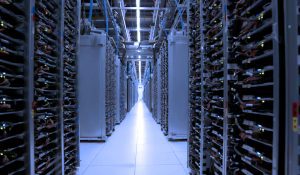Most of the cloud and colocation service provider clients I meet are concerned with offering high-reliability data center operations to their customers. In a previous blog post, I talk about how service quality is seen as a critical success factor in achieving their business goals of growth and profitability.
I recently had a chance to speak with one of Schneider Electric’s key executives dedicated to supporting our cloud and colocation service providers, Selena Nimerick. Based in Singapore, Selena is VP of Customer Satisfaction & Quality with Schneider’s Secure Power Division. Her insights into the evolution of customer support will help set expectations for how partners can best help cloud and colocation service providers achieve systems reliability goals.

Critical Success Factors for Colocation Providers – Our Discussion
Mark: What actions are you taking to drive high customer satisfaction?
Selena: Working as an advocate on behalf of our customers and marshalling our corporate resources to address customer business requirements is the type of work that I’m passionate about. While in this role, I’ve had the privilege of interfacing and building relationships with our customers across the globe and have gained new insights on the business challenges they face. In order to better support our customers, I initiated an internal team transformation process that involved the integration of both regional/global teams and lines of business teams. In observing the nature of the relationship between most cloud and colocation service providers and their vendors, we saw a gap in the willingness of many of the suppliers to fully understand their clients’ holistic operation. In order to address this gap, we tailored our customer support process to address key touchpoints across the entire customer journey. This includes fully supporting the product education, quotation and bidding, delivery, installation and ongoing support processes. We want to ensure that we’re crafting an experience tailored specifically to our global strategic and targeted accounts. So far, our customers have expressed a high degree of enthusiasm for this more holistic support approach.
Mark: From a quality and customer satisfaction perspective, what expectations and needs are you hearing from these customers?
Selena: Many of our customers prefer a single point of contact, someone within the quality organization that can partner with them as they journey through their operational, asset management and business growth challenges. Our dedicated team of professionals works very closely with these accounts to provide the unique, tailored experience that’s required.
They also like for us to focus on precision when it comes to delivery of our products. By providing accurate lead times, we make it much easier for them to plan projects and to support the needs and requirements of their own customers.
Mark: What steps do you take to help them achieve their systems reliability business goals?
Selena: Sharing reliability metrics with our customers. We work with their internal teams to improve system-wide reliability. When we have hundreds of products within a single colocation installation, for instance, component failure has a significant impact on the level of trust these customers have in us. They often request regular reliability reviews, to evaluate the performance of our products and the failure rates. The data we provide and the information we share give them confidence that the solutions we deliver and deploy on their behalf are dependable and predictable.
Beyond constantly improving the reliability of our own products, we also work hard to ensure that our equipment integrates well with the other equipment on their site. By developing a deep understanding of their third-party equipment, we are in a better position to support them with any challenges they face.
Mark: Beyond reliability, what other ways does your quality team help to support these customers?
Selena: We bring expert knowledge in specific areas like energy efficiency, sustainability and building management which, when combined with reliability, really define a new level of colocation business resilience. This knowledge represents an intelligence that colocation providers were never able to access before. Data centers are huge consumers of energy. By consolidating our massive collection of product behavior field data, we can address such challenges through optimization that simultaneously boosts systems uptime while reducing overall energy consumption by up to 30 percent.
Mark: In closing, what makes the Schneider Electric partnership unique in the eyes of your cloud and colocation customers?
Selena: Every one of our colocation customers is unique and we partner with them to address their individual needs based on business models and immediate or long-term objectives. For those cloud and colocation customers looking to expand globally, we stock every region of the globe with spare parts and are capable of rapid delivery and installation of these spare parts should the need arise. Our engineering experts are also available 24 hours a day, across the globe to consult with cloud and colocation service provider stakeholders on all matters pertaining to data center resiliency. We recognize our customers’ expertise in their field and encourage their input into our R&D and solution development processes.
We also acknowledge, especially in the age of digitization, that no one company can do it alone. For that reason, we have established thousands of partnerships worldwide with software developers, system integrators, OEMs, distributors, consultants and others in order to offer our customers holistic, comprehensive solutions.
So, between the global platform and resources we have across our organizations, as well as the personalized focus to each of our customers, I believe that’s a partnership that stands out in the industry.
Access to Industry Experts for System-wide Support
To learn more about Schneider Electric’s commitment to the global cloud and colocation service provider community visit the Schneider Electric Exchange platform, a global network of experts and peers. The purpose of Exchange is to foster and nurture the development of new ideas via a community of industry experts that both share and consume new concepts and solutions. The Exchange ecosystem combines the power of the marketplace with that of an active online community. Exchange provides a means for staying current regarding new players within a given industrial space, and for accelerating innovation when it comes to implementing IoT and connected solutions.



